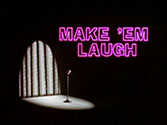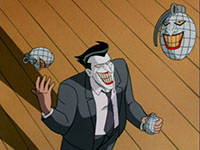|
||
|
| Credits | Cast | |
Written by Paul Dini & Randy Rogel Directed by Boyd Kirkland Music by Michael McCuistion Animation by Dong Yang |
Kevin Conroy as Bruce Wayne Loren Lester as Dick Grayson Efrem Zimbalist Jr. as Alfred Mark Hamill as The Joker Liane Schirmer as Renee Montoya |
Mari Devon as Summer Gleeson Richard Jeni as Host Andrea Martin as Rolling Pin Stuart Pankin as Condiment King Grant Shaud as Pack Rat |
|
One way of distinguishing between Jokers is with the question, Is he a clown or a comedian? As I mean the terms, these are not the same kind of thing. Clowns are about masks and pantomime, comedians about exhibitionism and the flaunting of private foibles. Comedians try to give us a shock of recognition, to show us something about ourselves by showing themselves up. But clowns are dehumanized and dehumanizing figures. The difference between a comedian and a clown is the difference between laughing with someone at ourselves, and laughing at someone who is in no way like us. It seems to be the mask that makes the difference. The clown's pall of greasepaint both deflects the audience's gaze from the figure beneath and deflects the performer's anxieties back onto himself. Unable to penetrate the outer layer to the person beneath, the audience is witness to behavior unanchored to anything internal; buffeted by slapstick and incapable of explaining himself, the clown could just as easily be a mechanical figure wound up and let go in a world of pratfalls. Unable to express himself through the mask, he loses the ability to participate in society and is driven into neurosis and obsession, making him still easier prey to the machinations of the banana peel. Clowns are figures of horror because, even in the thickest crowd, they are in a kind of solitary confinement. The sadness that attends them is pity at the sight of madness; the fear that attends them that of madness turning to malice. The Joker of the comics may be a clown, but the Joker of BTAS is not. It is all too easy to explain his actions, be they robbery, blackmail or simple murder, because he himself is quite fond of and articulate in explaining them. In this episode, he wants a trophy that will confer on him the title "Funniest Man in Gotham." Now, this may be an unreasonable thing to want, and his actions in pursuing it may be unreasonable, but only in the sense of being disproportionate or ill-conceived. The point is that once he has explained his reasons, we understand perfectly well why he is doing what he does. To see the Joker as a comedian also explains two other features of his persona. First, no matter how malicious his plot, he always keeps one eye firmly cocked on the audience to see how it "plays." True, he wants his jokes to go over with a bang, but he still wants his audience to get the joke before being taken out by the bang. Second, it also explains his pronounced fondness for television parodies (the TV special in "Christmas with the Joker"; the fish commercial in "The Laughing Fish"; the late-night show in "Almost Got 'Im"). As a frustrated performer he naturally seeks the most common outlet of expression. I also said that comedians show us something about ourselves. Now, we all love comedy and dislike chaos, but comedy thrives on chaos. The Joker rubs our nose in the contradiction. How better to combine them than by unleashing three hapless villains as part of a complicated scheme whose only purpose is to win a fancy kind of spitoon? By turning his victims into figures of mockery and trusting the public's amusement to destroy them for him, he will use the chaos of comedy to create the confusion that will get him the comic title he covets, and will do so in a way that makes the public complicit in the very crime he is committing. So perhaps he really does deserve that trophy. Side note: As Lisa Lorraine eats potato chips and watches TV, you can hear the Riddler's television ad ("Riddler's Reform") play in the background. |
|
|
|
Related Episodes |
What Others Are Saying ... |
| Back to Mad as a Hatter |
Forward to The Man Who Killed Batman |


